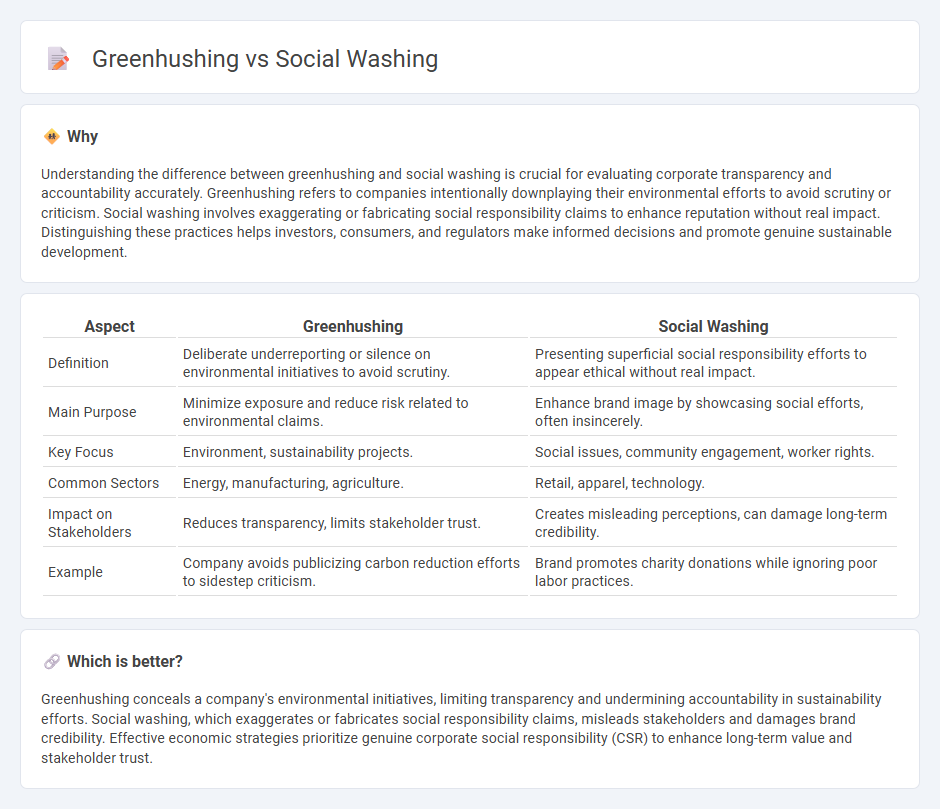
Greenhushing and social washing both represent strategic communication approaches companies use to influence public perception while managing their environmental and social responsibilities. Greenhushing involves deliberately underreporting or minimizing sustainability efforts to avoid scrutiny, whereas social washing exaggerates social initiatives to enhance a company's ethical image without substantial action. Explore the distinct impacts of these practices on corporate transparency and consumer trust.
Why it is important
Understanding the difference between greenhushing and social washing is crucial for evaluating corporate transparency and accountability accurately. Greenhushing refers to companies intentionally downplaying their environmental efforts to avoid scrutiny or criticism. Social washing involves exaggerating or fabricating social responsibility claims to enhance reputation without real impact. Distinguishing these practices helps investors, consumers, and regulators make informed decisions and promote genuine sustainable development.
Comparison Table
| Aspect | Greenhushing | Social Washing |
|---|---|---|
| Definition | Deliberate underreporting or silence on environmental initiatives to avoid scrutiny. | Presenting superficial social responsibility efforts to appear ethical without real impact. |
| Main Purpose | Minimize exposure and reduce risk related to environmental claims. | Enhance brand image by showcasing social efforts, often insincerely. |
| Key Focus | Environment, sustainability projects. | Social issues, community engagement, worker rights. |
| Common Sectors | Energy, manufacturing, agriculture. | Retail, apparel, technology. |
| Impact on Stakeholders | Reduces transparency, limits stakeholder trust. | Creates misleading perceptions, can damage long-term credibility. |
| Example | Company avoids publicizing carbon reduction efforts to sidestep criticism. | Brand promotes charity donations while ignoring poor labor practices. |
Which is better?
Greenhushing conceals a company's environmental initiatives, limiting transparency and undermining accountability in sustainability efforts. Social washing, which exaggerates or fabricates social responsibility claims, misleads stakeholders and damages brand credibility. Effective economic strategies prioritize genuine corporate social responsibility (CSR) to enhance long-term value and stakeholder trust.
Connection
Greenhushing and social washing both involve companies deliberately underreporting or misrepresenting their environmental and social initiatives to avoid scrutiny or backlash. These practices undermine transparency and accountability in corporate sustainability efforts, making it difficult for stakeholders to assess genuine commitment to ethical standards. The connection lies in their shared impact on masking the true extent of a company's social and environmental responsibility.
Key Terms
Corporate Social Responsibility (CSR)
Social washing refers to companies exaggerating or fabricating their CSR efforts to appear more socially responsible without substantial impact. Greenhushing occurs when organizations intentionally downplay or underreport their sustainability practices to avoid scrutiny or criticism. Explore in-depth how these contrasting approaches affect corporate transparency and stakeholder trust.
Reputation Management
Social washing artificially boosts a company's image by exaggerating social responsibility efforts, often misleading stakeholders about genuine impact. Greenhushing involves deliberately underreporting or concealing environmental initiatives to avoid scrutiny or criticism, potentially harming transparency and trust. Explore effective reputation management strategies to navigate and address these reputational challenges in corporate communication.
Regulatory Compliance
Social washing refers to companies exaggerating their social responsibility efforts to appear compliant with regulations, while greenhushing involves deliberately downplaying sustainability initiatives to avoid scrutiny and regulatory pressure. Regulatory compliance in social washing often leads to misleading claims about social and environmental impact, whereas greenhushing limits transparency and stakeholder trust in genuine sustainability progress. Explore how regulatory frameworks influence company disclosures and shape accountability in these contrasting practices.
Source and External Links
What is Social Washing? - Social washing is when companies present themselves as socially responsible to mask underlying negative social impacts, often through misleading marketing tactics aimed at improving their public image.
On the rise: navigating the wave of greenwashing and social washing - Social washing occurs when businesses deliberately obscure social issues--such as human rights abuses, child labor, or community impact--by promoting a positive image that contradicts their actual practices, primarily to protect their reputation and financial performance.
Social washing: social commitment or just a marketing strategy - Social washing is a deceptive strategy where companies exaggerate or fabricate their commitment to social causes--like equity and diversity--without implementing real actions, aiming to attract consumers, investors, and employees by creating a false impression of social responsibility.
 dowidth.com
dowidth.com